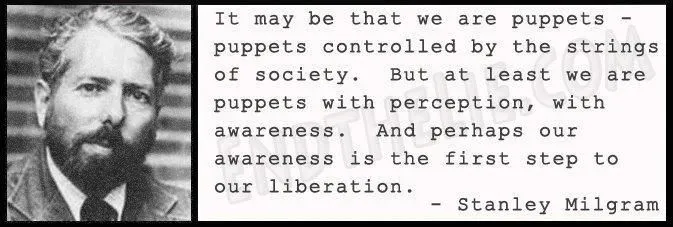From Shocking Obedience to Modern Day Parallels: Unraveling the Deep Psychological Effects of Authority – How the Milgram Experiment’s Alarming Insights Relate to Today’s Global Events. Are We Unwittingly Repeating History?
In the intricate tapestry of human behavior, the Milgram experiment emerges as a compelling narrative, illustrating the profound impact of authority on individual actions. Conducted in the era marked by the trial of Adolf Eichmann and his notorious defense at Nuremberg – “befehl ist befehl,” translating to “an order is an order” – this experiment provides a haunting insight into our predisposition to obey. It’s a stark revelation of how ordinary individuals can be compelled to act against their moral compass under the weight of authoritative commands.

Participants in Milgram’s study, under the pretext of a learning experiment, were instructed to administer electric shocks to a “learner” (in reality, an actor) for each incorrect answer. The shocks ranged from a mild 15 volts to a potentially lethal 450 volts, ominously marked as “XXX.” As University of California’s Gregorio Billikopf Encina notes, the actor’s responses escalated from mild discomfort at 75 volts to agonizing screams at 285 volts, culminating in a disturbing silence at 330 volts, should the participants choose to proceed that far.
Must See–> The Globalist Death Cult’s Endgame: How They Plan to Erase What Makes Us Human!
What is profoundly unsettling is that 65% of the participants delivered the maximum shock, despite moral conflict and the clear absence of any real benefit to themselves. This experiment uncovers a dark facet of human nature: our tendency to conform to authority, even at the cost of our ethics.

Drawing parallels with recent global events, one can’t help but see the shadows of the Milgram experiment. The Covid-19 pandemic, for instance, morphed into what some perceive as a modern rendition of this psychological drama. Governments worldwide imposed lockdowns, and citizens, in a display of unprecedented obedience, followed suit. Was this a collective effort to combat a public health crisis, or were we unwittingly part of an elaborate exercise in compliance, akin to the Milgram study?
Moreover, the handling of the pandemic – mandatory masking, social distancing, and the rapid development and distribution of vaccines – sparked debates. Some view these measures as necessary evils in the fight against a deadly virus, while others see them as overreaches of authority, exploiting the public’s fear and compliance. Were we, as a global community, participants in a grand experiment, testing our thresholds for obedience under the guise of public health?
The 2020 U.S. Presidential election and its aftermath further echo the themes of Milgram’s findings. The controversies surrounding the election – allegations of fraud, the storming of the Capitol, and the ensuing political turmoil – have raised questions about the nature of authority and our response to it. These events, much like the shocks in Milgram’s experiment, tested the limits of public compliance and the extent to which people would go to either support or oppose the authoritative narrative.
As we reflect on these events, it’s crucial to ask ourselves: Are we mindlessly following orders, or are we critically evaluating the actions of those in power? Milgram’s experiment, in its stark revelation of our propensity to obey, serves as a cautionary tale. It warns us of the dangers of blind obedience and the importance of maintaining our moral compass, even in the face of overwhelming authority.
In conclusion, while the Milgram experiment was a study conducted over half a century ago, its implications resonate profoundly in today’s world. It serves as a reminder that the power of authority is immense and often, dangerously persuasive. As individuals and as a society, we must strive to balance respect for authority with critical thinking and ethical judgment. Only then can we hope to navigate the complex and often murky waters of power dynamics in our modern world.

Tokyo Police Entering American Embassy: The First Step in Trump’s GESARA Plan, EBS Activation, and US Military’s New Role!


